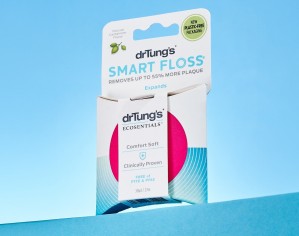As we learned in the previous blog post
Plaque and Health Part 1: What is Plaque?, plaque is a harmful community of microorganisms - known as a microbial biofilm - found on tooth surfaces. Plaque buildup can lead to other oral health and overall health issues, so it's important that you practice habits to remove plaque daily.
Remove Plaque from Teeth
Daily brushing and flossing are critical habits to prevent plaque buildup. Not only is it important to brush and floss with an effective technique, but the quality of the products used are just as integral to your oral health success. Tooth brushing is the first and foremost means for plaque removal from teeth - a go-to activity in a daily oral wellness routine. Of course, the quality of your toothbrush is important, as different types of toothbrushes may be more or less effective than others. Unlike most toothbrushes - which try to force plaque off the teeth by friction -
DrTung's Ionic Toothbrush makes teeth let go of plaque, like turning off a magnet. Research shows up to 48% more plaque is removed than a manual toothbrush. Without this type of efficiency, one risks the negative effects of brushing too hard to compensate while trying to remove plaque. This over-brushing can be harmful and cause damage to gums. Brushing, however,
only covers about two-thirds of teeth surface area. In order to disrupt plaque and debris buildup from in between teeth -
the remaining one-third of teeth surface area - an interdental tool such as floss must be used. Possibly because cavities usually form on the surfaces between teeth, the Academy of General Dentistry (AGD), claims that flossing is the single most important weapon against plaque. Flossing can remove food and debris that could otherwise become stuck between teeth. Use
Smart Floss® around and between teeth for more effective cleaning of the i
nterproximal spaces, where oral biofilm (bacterial plaque) accumulates. Smart Floss® stretches and expands and has been clinically shown to remove up to 55% more plaque than other leading floss types. Beyond personal daily maintenance of teeth, it's important to schedule regular dental cleanings. This will help to prevent plaque buildup over time by cleaning hard-to-reach places, such as below the gum-line.
Remove Plaque from the Tongue
The tongue harbors bacteria that accumulate in the mouth at night and throughout the day, just like dirt and debris that may accumulate on a rug. If left unattended, bacteria, or soft plaque, will continue to multiply and build up on the tongue, and usually produces a foul odor. Research has shown that cleaning the tongue not only helps to eliminate bad breath, but significantly inhibits plaque formation
on the teeth,†
RDH Magazine advises hygienists "to recommend a tongue-cleaning device that removes the debris appearing as a gray-white layer on the tongue." So use your
DrTung's Stainless Steel Tongue Cleaner to scrape your tongue daily, a habit that so many of our users tell us
"is totally essential. I cannot live without it!" † Ref: Gross, Barnes, Lyon. "Effects of Tongue Brushing on Tongue Coating and Dental Plaque Scores". J. Dent Res Nov-Dec 1975,Vol 54 No. 6




By Vicki Toews 07/20/2020 08:28:12
Thanks for your message Carlota. I sent you a direct email with more information.
By Carlota Maria Shalygin 07/16/2020 05:26:43
Can I get an advertising package- or panfleto or flyer to put in my operatory. I want to promote your product to my patients after their dental cleaning visit. Thanks.
By Reign Dental 10/4/2017 23:23:45
Indeed, Brushing and Flossing can help people to remove Plaque easily. However, one should also visit dentist regularly to prevent severe dental problems.